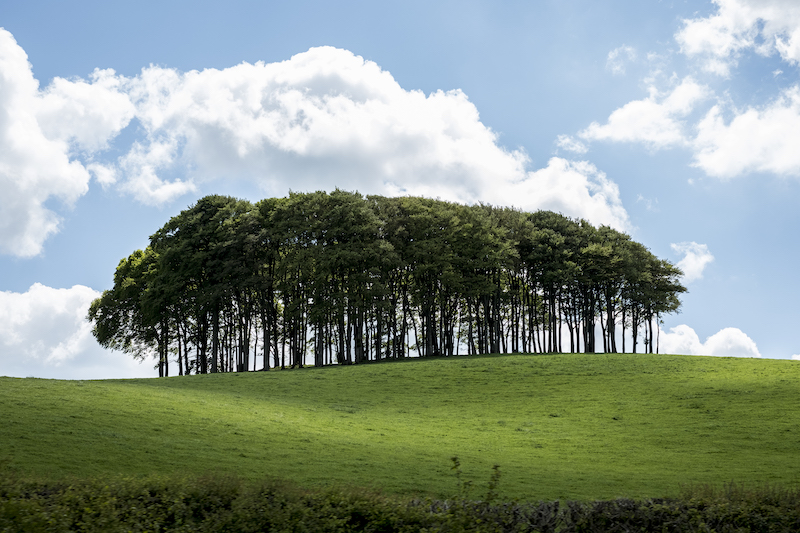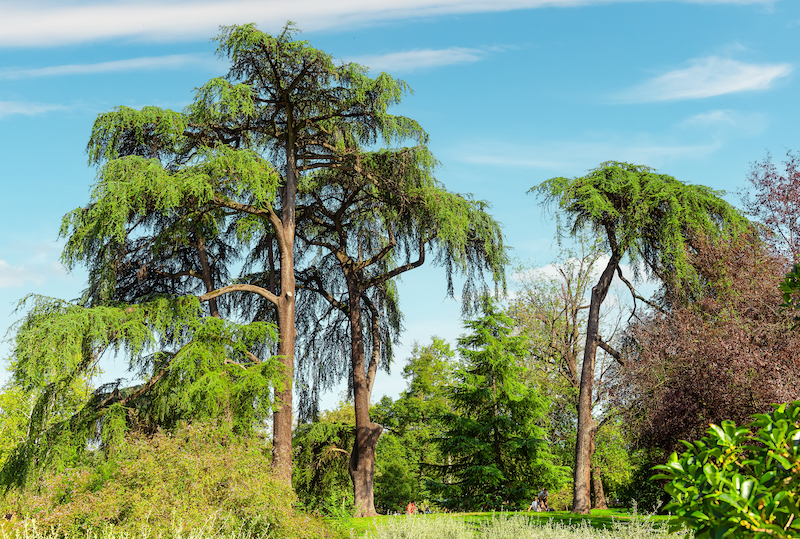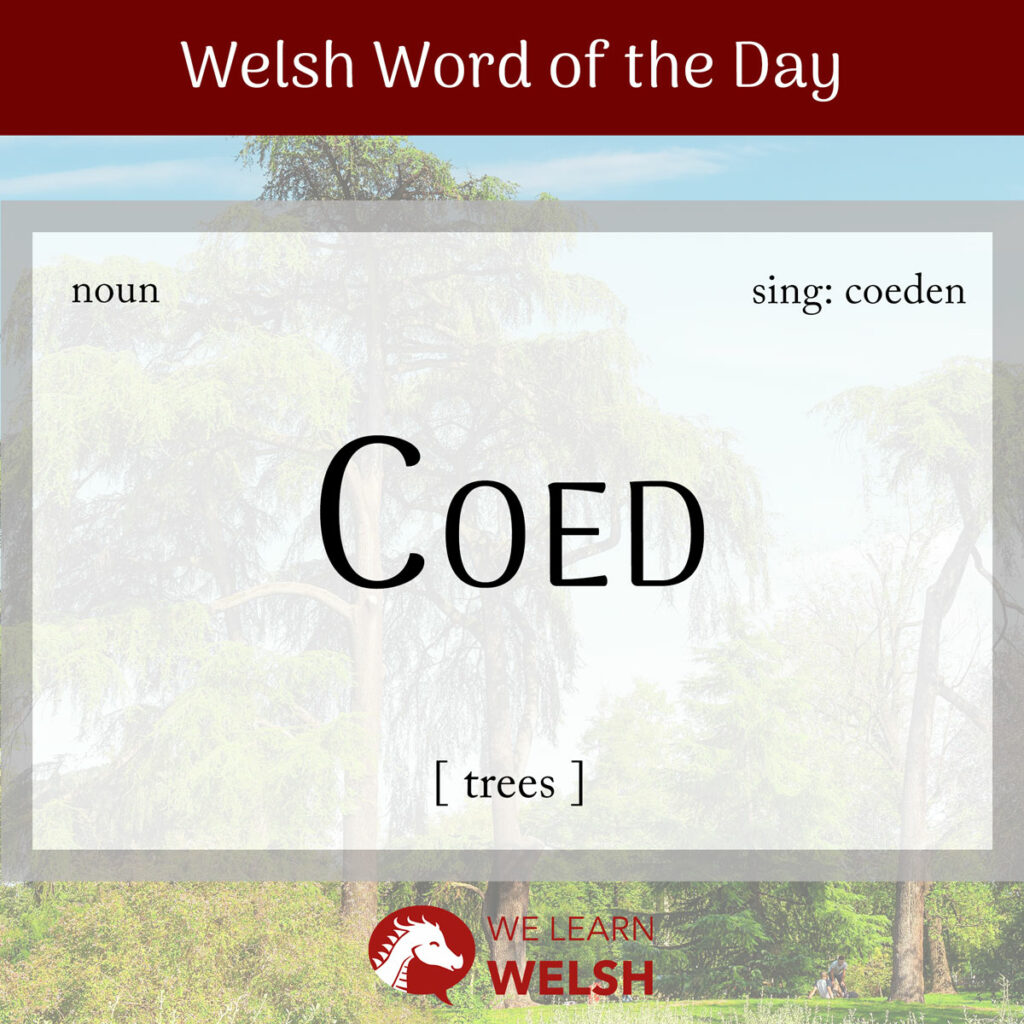It’s hard to imagine what landscapes like those of the UK looked like before humans began to interfere with them. Nature historians believe that most of Britain was covered with a vast expanse of coed (trees or woodland) that is referred to as The Wildwood (Y Goedwig in Welsh, literally just meaning The Forest). It’s a great name, right?
Today, only 1% of this dense forest remains. But it’s possible that Y Goedwig persisted longer in Wales than it did in other parts of the UK, due to a smaller and poorer human population.
Whatever the history of the beautiful coed of Wales, it’s a useful word to know. Coed is a collective noun referring to trees, and it’s also used a lot in Welsh to mean a wood as in an area of woodland or a small forest. While a tree is coeden, multiple woods are coedydd. It’s a funny one, because coedydd is basically the plural of a plural!
coed
trees
Some Southerners may pronounce coed like this when speaking casually:
I referred to coed as a collective noun. This is a kind of noun in Welsh where the default version of the word is the plural rather than the singular – indeed, coed is the word listed in dictionaries rather than coeden.
Collective nouns are fairly common in Welsh. They’re often used to refer to nature-related words, and interestingly, their singulative forms are more often considered feminine rather than masculine. This is true for coeden, too; it’s a feminine noun, so the tree is y goeden.

Here is how coed itself mutates:
Soft mutation
goed
Nasal mutation
nghoed
Aspirate mutation
choed
Coed comes from the proto-Celtic *kaitos, which itself originates from the proto-Indo-European root *kayt, which referred to forest or pasture. It’s actually related to the English word heath.
In turn, coed is the parent of a few other words in modern Welsh. I already mentioned coedwig (forest). Although coedwig and coed are pretty much synonyms when used to refer to a group of trees, I find that people more often use coedwig to refer to a larger area, and so I think coedwig is best translated as a forest and coed as a wood. This may differ regionally!
A woody area is coediog, coedog, or simply llawn coed (full of trees). It may also be populated with llwyni (bushes), gwair (grass), blodau (flowers) and mangoed / coediach (various kinds of small trees, shrubs and undergrowth).
Another useful word is coedwigo, which means to afforest, as in to plant trees. You can also say datgoedwigo to refer to deforestation. On the other hand, the much simpler verb coedio just means to construct timberwork, so it refers more to building new things out of wood rather than producing the wood itself.
Mae ‘na lawer o goed yn fy ngardd i.
There are lots of trees in my garden.
In Welsh, when we want to talk about something that is made of wood, we most often use the word pren. Historically pren was almost a synonym of coeden – for example the word prennau was often used to mean trees. (Another synonym, more common in the South, is colfen).
This kind of usage isn’t obsolete, but in my experience coed is the more common choice when you’re talking about living trees in natur (nature), and pren is used more to discuss the material. So a piece of wood can be either darn o goed or darn o bren, but I personally would go for the former if I were talking about something I found in a coedwig, and the latter if I was talking about building.
One exception is with the word carpentry, which is usually called gwaith coed, not gwaith pren. Alternatively, the word saernïaeth is also used. You can also use the word coed defnydd (textile wood / useful wood) as a synonym of pren.
Pren comes in handy, too, when translating the popular English idiom can’t see the wood for the trees. Since wood as a singular and trees as a plural are the same word in Welsh, pren steps in to the rescue to provide the distinction, and this phrase is generally rendered methu gweld y coed gan brennau.
Rydyn ni’n edmygu’r deiliant unigryw ar y goeden hon.
We’re admiring the unique foliage on this tree.
There are a lot of native Welsh idioms and proverbs that use the word coed. For example, if you are completely denying something (especially something you are wrong about) you are gwadu coed a maes a mynydd (denying wood and field and mountain).
If you later come to your senses, you are dod at dy goed, or literally coming to your wood. This can be a little embarrassing after tyngu i’r cyrs ac i’r coed (swearing to bog and to wood) that you were right!
The word coed also turns up in idiomatic Welsh names for a lot of different kinds of native British animals, particularly birds.
- ehedydd y coed = woodlark
- coblyn y coed / cnoc y coed / taradr y coed = woodpecker
- telor y coed / canwr y coed = woodwarbler
- sgrech y coed = jay
- colomen goed = woodpigeon
- pibganwr y coed = tree pipit
- baedd coed = boar
- genau goed / madfall y coed = (viviparous) lizard
- gwrach y coed = woodlouse
- iâr goed = pheasant
- bele’r coed = pine marten / wood marten
- cath goed = polecat
- cacwn y coed / gwenyn y coed = tree hornets
The most versatile, though, has got to be mochyn y coed (pig of the trees), which is used to refer to all kinds of animals from wild pigs to hedgehogs, and badgers to woodlice! It’s even a common term for pinecones.
You may have noticed that while most of these names end in y coed, the word coed doesn’t mutate after y, even though coeden is a feminine noun. This is because feminine nouns don’t mutate after y when they are plural. And even when coed is used in the sense of a wood in English, it remains a plural noun in Welsh—because, quite literally, it means trees.
Es i am dro yn y coed.
I went for a walk in the wood.
When Wales (and the rest of this little green island) was covered in coed, it was most likely by the kinds of species that still dominate our landscape today, like derw (oaks), cerddin (rowan trees), yw (yews), bedw (birches), afallennau (apple trees), gwerni (alders), sycamorwydd (sycamores), celyn (holly trees), and llwyfenni llydanddail (wych elms).
Like in many other countries, Wales’ rich biodiversity and diverse plant life, including coed, are under threat from the pressures of overpopulation and environmental challenges. Its breathtaking landscapes depend on a delicate ecosystem, where every coeden plays a vital role in preserving that natural beauty.
So, for those of us who call Wales home, protecting and preserving our coed and coedydd is absolutely crucial.


